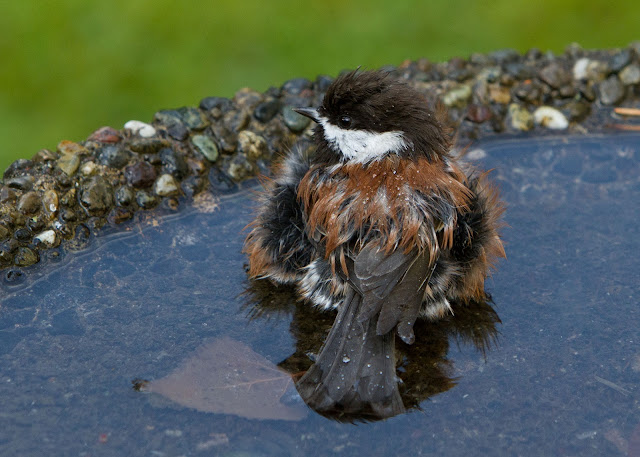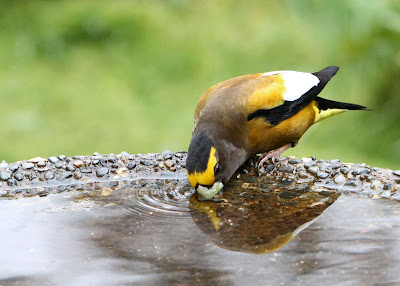For the Birds: Water the Birds, not your lawn
Tuesday, August 9, 2022
 |
| Chestnut-backed Chickadee cooling off. Photo by Craig Kerns |
By Christine Southwick
Your dormant lawn will recover this fall — dehydrated birds may not!
It’s easy to provide water for birds, ranging from ponds, fountains and bird baths down to a plastic plant pot liner placed where you can watch it.
 |
| Wilson's Warbler bathing. Photo by Chris Southwick |
Moving water, especially falling water, will attract migrants as they fly near your property and hear the welcome sound of often hard to find water.
They will veer toward your yard, stop, and fill up with much needed water, often saving their lives, especially now that many of their migration drinking stops have become dry.
Some may even take a quick bath, allowing them to cool down, refresh and take a much-desired rest before continuing on.
A birdbath can be as small as a plate, as long as it is in a safe location from cats and isn’t too deep.
Fountains will attract birds because they can hear and see moving water.
A small pond will often attract different birds than a bird bath, especially if there is a small moving element.
And if your yard offers food by having native plants with bird-enticing bugs or fruits, or bird feeders, many birds will add your yard to their migration rest stops both going and returning.
 |
| Evening Grosbeak drinking water. Photo by Craig Kerns |
Birds don’t swim, so a couple of large rocks will allow them to stand, splash and drink.
My dripper/mister drips down into two ground bird baths, around which I have a decorative metal fence on three sides to discourage wandering cats, and on the back side of this waterfall I planted salmonberries for the same reason.
Migrants like MacGillivray’s Warblers, Western Tanagers, and Swainson’s Thrushes have stopped at my water setups during many of their migrations. Resident birds use my fountains daily, year-round.
Migrants like MacGillivray’s Warblers, Western Tanagers, and Swainson’s Thrushes have stopped at my water setups during many of their migrations. Resident birds use my fountains daily, year-round.
 |
| Red-breasted Nuthatch drinking at a fountain. Photo by Craig Kerns |
Fountains recirculate the water, which is good conservation, and offers a pleasant babbling sound.
They are easy to set up, can be moved if you so desire, and offer beneficial and enjoyable decoration.
A small pond will often attract different birds than a bird bath, especially if there is a small moving element.
A waterfall or pond is a major investment in work, but oh, the birds it will bring in!
Make your yard a bird magnet. Both you and the birds will be glad you did.
See previous For the Birds articles here
Make your yard a bird magnet. Both you and the birds will be glad you did.
See previous For the Birds articles here




0 comments:
Post a Comment